In recent years, Israel has become a force to be reckoned with in artistic swimming. Freshly crowned European Champions and three-time gold medalist on the World Cup circuit, the nation has slowly but surely made its way amongst the historical powerhouses of the sport.
However, artistic swimming is a relatively recent sport in Israel. Really, it all started a little over 30 years ago with a traveling circus, a few dolphins, and a handful of Soviet synchronized swimmers.
Svetlana Blecher, current coach of the Israeli national team, has been there since the beginning. However, nothing destined her to bring what was then known as synchronized swimming to a country that was thousands of kilometers away from her home.
Born and raised in the Soviet Union, Svetlana was a synchronized swimmer herself. She trained in Moscow under renowned coach Maria Maksimova, and won multiple national championships titles with her team throughout her career. After retiring when she was about 20, she started coaching here and there, notably spending three years in Tbilisi, the capital of modern Georgia. She was young and enjoyed that time of her life, trying to figure out what she wanted to do next while seemingly going wherever the wind would take her.
One day, she heard that one of her friends’ husbands, an acrobat, was set to travel out of the USSR with a circus company. The show would notably feature dolphins, and was headed to Tel Aviv in Israel. Svetlana wanted in, and convinced her small group of synchronized swimming friends to come along.
“If you have dolphins, you have a swimming pool, if you have a swimming pool, you have to have synchronized swimming,” she said. “It was really born like this. There were many other shows in Moscow that were more prepared with costumes, programs, etc. We were just five girls, just sitting around one day when we heard about this circus. Just like that, we decided we would go.”
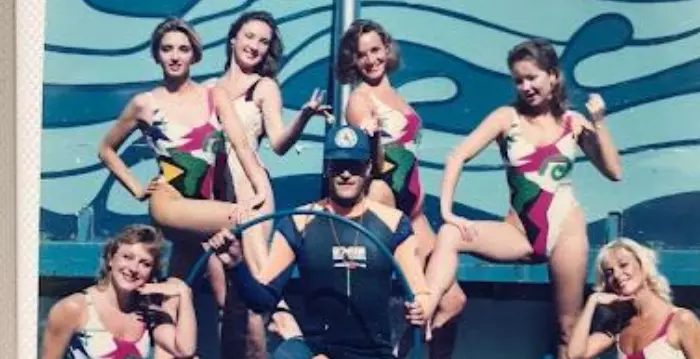
It was 1989 and the Soviet Union was slowly starting to open up. She and the 70 or so company members became the first Soviet group of artists to ever travel outside of the country, and the first to come to Israel.
The circus show was held in the Dolphinarium in Tel Aviv. She fondly remembers that first plane ride to Israel, “like a scene out of a movie,” as she sat next to dolphins. The entire company had indeed flown with all the animals besides them on the plane that was specially chartered for them.
At first, their synchronized swimming act was very short, maybe only five minutes or so out of the entire performance that included acrobats, clowns, or dog numbers amongst others. They stayed in Israel for eight months and returned to Russia for the winter. They came back the following year, and again the next, each time better prepared and with improved synchronized swimming show routines.
The circus was tremendously popular and the swimmers well acclaimed. So much so that they were asked to stay in Israel. Synchronized swimming didn’t exist in the country at all, but an executive at the swimming federation, a fellow Soviet citizen, liked what he saw and offered them jobs to get it off the ground. Most of them, including Svetlana, thus immigrated to Israel and in 1992, opened a small synchronized swimming club.
“At the time I didn’t think it would become my country,” she said. “I was 25, and it was a nice country with the sea nearby so it looked great to me. The federation paid us a little, and it was enough to live. We weren’t looking for money or thinking about the future. It was just for the experience at that moment, and to try to do something here with synchronized swimming.”
At the beginning, it was only their one club, and they fought hard to get started and recruit athletes. After a few years, a few more Soviet coaches made their way to Israel and started their own clubs in different parts of the country. One of them was Tatiana Tsym, who arrived in Israel from Greece with her daughter Anastasia Gloushkov, nine years old at the time.
For the next decade, the number of clubs remained very small, less than a handful, and they eventually started to compete amongst themselves nationally. Svetlana tried to build a national team and enter Israel in international events, although sometimes she didn’t even have eight athletes.
Israel made its first appearance as a team on the senior stage at the 1996 European “B” Cup. The country then competed at the 1997 European Championships in the solo, duet and team events. Only six swimmers took part in the latter, and finished 16th overall.
“At the time I never ever dreamed about medals at the European and World Championships,” Svetlana said. “It wasn’t even possible to think about it; I was just happy if we were not the last ones in the results. I remember looking at the list of participants before we would go to a meet. If I saw some new country that had just begun too or was competing for the first time, I would be very happy because maybe Israel wouldn’t be the last one.”
In the following years, Anastasia Gloushkov truly put the country on the map. In 1999, she made her first appearance on the senior stage at only 14 years old, already competing amongst the likes of Olga Brusnikina, Virginie Dedieu, Christina Thalassinidou, Gemma Mengual and Giovanna Burlando.
Her significant breakthrough came the following year at the COMEN Cup, the major international competition at the time for the 13-15 age group, where she won gold in figures, solo and duet. She also competed in the senior squad at the 2000 European Championships. In 2004 and at the age of 19, Anastasia qualified to the Athens Games in the duet with Inna Yoffe. Both were Israel’s first synchronized swimmers to qualify for an Olympic Games. Anastasia competed internationally for 16 years and eventually became a four-time Olympian (2004, 2008, 2012, 2016) and the first Israeli female athlete to go to as many Olympics.
About three years into her stay in Israel, Svetlana had also met her husband. In November 1997, she gave birth to her twin daughters Eden and Emily. Although she’d bring them to the pool, the two didn’t immediately start synchronized swimming. They had learned how to swim, but much preferred going to gymnastics and dance lessons.
However, the twins eventually caved and took up the sport at eight years old. By default, Svetlana became her daughters’ coach. They loved every minute of it, although they found that being cold in the water was probably the hardest part of the sport back then. When they turned 15, Emily decided to quit to focus on horseback riding, a sport she still practices today. Eden stayed on.
Eden has been part of the Israeli national team since 2010, starting in the junior age category. In 2017, she competed in the World Championships in Budapest not only in the team but also in the duet for the first time. Indeed, Anastasia Gloushkov had retired after the Rio Olympics, along with her duet partner Ievgeniia Tetelbaum, and it was time for the country to introduce a new and young pair.
But these championships didn’t bring the results Israel had hoped for. The nation finished 21st in technical team, 22nd in free team, 27th in technical duet and 31st in free duet. That meet would ultimately become the tipping point, and what set off a chain of events that would impact the squad for the coming years.
“We really didn’t have good results,” Svetlana said. “I told the federation that we had to change everything if we want to improve as a team. Really everything. The system, the way we coached, the way we trained, everything. Thankfully, the federation listened.”
Not only did Svetlana understand they required change, but she also knew they had to bring in someone else to help. She needed an external eye and a more experienced coach with a totally different approach from anything she or the Israeli athletes had ever been accustomed to until then.
She and the head of the Israeli federation met with Anna Tarrés in Budapest. The Catalan coach was renowned in synchronized swimming for her iconic choreographies, and for bringing Spain to four Olympic medals, 26 World Championship medals, and 25 European Championship medals. When she had first taken over the national team, Spain wasn’t even qualifying to finals. Svetlana wanted the same remarkable turnaround for her country.
The Israeli delegation knew they had a lot of convincing to do to bring someone of her caliber to Israel. But they had to try. Svetlana could see the Israeli athletes had a lot of potential, and really believed they could make history. But Anna had to see it for herself as well, and not base her decision solely on the results from these World Championships.
Anna did go to Israel. She agreed to work with the team, but under one condition: they had to trust her 200 percent. Fellow coach Bet Fernández, who has worked alongside Anna in club and national team for over two decades, also made the trip.
“Initially when we were told that Anna agreed to work with us, we were all ecstatic,” Eden recalled. “Although we didn’t really understand what she saw in us, the Israeli national team ranked 22nd in the world…”
Previously, the national team only got together for training camps, usually a few times a year and especially prior to big competitions. But when Anna and Bet arrived, they immediately knew they couldn’t work like that. The entire structure of the national team had to change, but the athletes bought in. They started training together every day.
Shelly Bobritsky was part of the 2017 World Championships squad alongside Eden. She was only 16 at the time, and certainly remembers the before and after.
“[Anna] turned everything we knew about the sport upside down,” she said. “Starting with the content of the training, the hours, the difficulty, the choreography, and our own mental strength. After working with her, we learned to set goals that are much bigger than we ever thought we could achieve.”
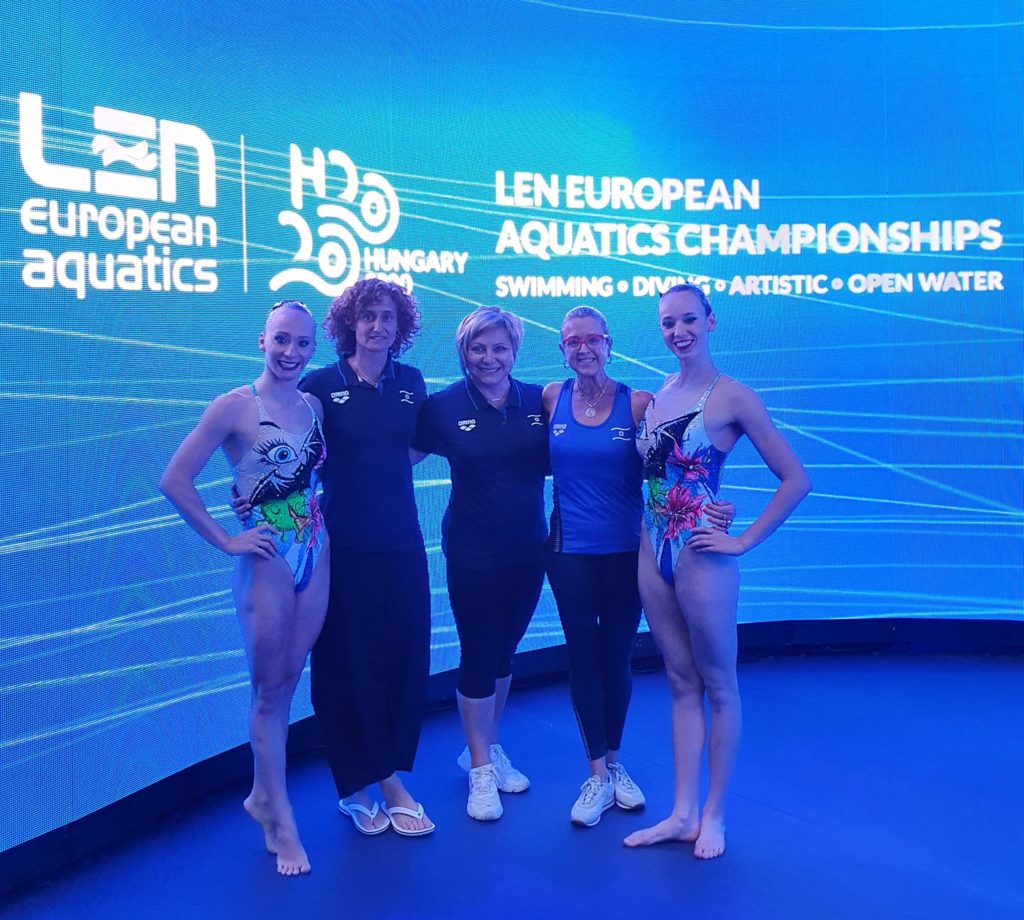
Before Anna came for the first training camp, she asked the athletes to learn the Russian mixed duet routines. They then had to swim it several times in a row until she had a better picture of what everyone’s abilities were. After each practice, she gave the athletes “homework,” like learning a routine from any of the top five countries in the world. The swimmers had to learn complex choreographies from a video in just a few hours and perform it the next day.
“Her main goal was to help us understand that we could do way more than we think we can,” Eden said. “The first time she got here was a shock for everyone for sure. But she proved to us that it’s all a mental game and that we could do what we thought was impossible only a week prior. Before, after running through a routine once, we would be so tired that we could barely hold ourselves above the water. Then Anna came, and we would run through a world-class choreography 10 times in a row. She taught us to think quicker, to learn things faster, and to always be flexible for changes.”
The entire Israeli team, athletes and staff alike, certainly went through a massive learning curve. Svetlana recognized it was very difficult at first, and completely different from anything they had ever known. But, just like they asked, they all trusted them.
Anna and Bet have completely different coaching styles, yet complement each other perfectly. Anna is a visionary and visceral coach, with her mind always reeling with ideas and endless possibilities. Svetlana admitted it’s often impossible to know what to expect from her. Anna always keeps them on their toes, yet all while following the vision and path she has for the team.
“She surprises all the time,” Svetlana explained. “She can feel the atmosphere and the girls’ moods like nobody else. I don’t know any other coach like her. How she feels music, how she remembers every little detail, how she sees extensions… She sees everything. She always wants the girls and coaches to go out of their comfort zone. Go to our maximum, and then try to be even better.”
Bet exudes quiet confidence. Always discreet, calm and purposeful, she is extremely organized and plans everything meticulously. She likes to focus on technique, and can precisely pinpoint how to help each athlete with their skills.
“Her and Anna are the perfect pair,” Svetlana said. “I have never seen anything like it in synchronized swimming; two coaches who have worked for many years like a team. For me, it’s a true example, not just for sport but also for life. How they support each other, how they believe in each other, how they help each other… I have learned so much from them and from watching them together.”
The team didn’t have to wait too long to see these changes pay off. At the French Open in March 2018, Israel increased its scores by seven points in the free team, and five and a half in the technical team. The improvement in both technique and choreography was also obvious and astonishing. Such a rise had been the team’s goal for the end of the season, but none of them expected to see a return on investment so quickly.
Ariel Nassee, 14 at the time, had just joined the senior squad after a successful campaign in the 13-15 category the year before. Anna had seen the potential in her only a few months prior and immediately moved her up to the senior team.
“The French Open was our first realization of what our future can and will be,” she said. “Anna was, and still is, always pushing us and making us better. She understands synchro better than everyone. We trusted her completely. To see that all the hard work we had invested, came through already at this meet, was a phenomenal feeling.”
At the 2018 European Championships, the team finished eighth in both technical and free team, notably increasing their scores in the latter by 10 points since 2017. At the 2019 World Championships in Gwangju, Israel qualified to all four team finals, a historical feat and a testament to what they had believed in from the start. They indeed did not have to settle for being 22nd in the world.
Svetlana recalled how much she and fellow coach Larisa Kunin learned during these first few seasons. At the end of every training day, they would be analyzing videos for hours, training their eyes to see every little detail they might have missed. Both they and the athletes also learned to always be ready for anything and to never fear making changes at the last minute.
“Before, every girl knew her place on the team and we never changed it,” Svetlana explained. “Sometimes even three months before a competition. Anna totally broke our system. There were no limits. You need to change places in the team, so you change and go to that place. We need to change music, okay, we change music. If we didn’t have a swimming pool during the day, then we came at 9:00 pm and did what we had to do. The girls are ready for everything. Nothing is surprising for them.”
Before Glasgow it seemed the squad was stuck in a vicious circle. The athletes needed good results to obtain more funding and support, while also needing more funding and support to obtain good results. Their successful 2018 and 2019 seasons completely changed that. The team was now able to train and live full-time in Netanya at the Wingate Institute, the national institute for excellence in sports of the State of Israel. Occasionally, the team also headed to Barcelona for long training camps, typically before the major competitions of the year.
In 2019, Shelly and Eden started swimming together in the duet events for the first time. In Gwangju, they finished 18th in free and 19th in tech, and were hoping to make their Olympic dreams a reality the following year.
Of course, the COVID-19 pandemic hit at the beginning of 2020, and all competitions were rapidly canceled. Once the initial wave of strict restrictions and quarantine passed, Eden, Shelly and Svetlana were eventually allowed back in the Wingate Institute, fairly early on compared to other countries.
They used that time to challenge themselves, both physically and mentally, and to stay motivated in times of uncertainty. Every week, they learned a duet routine from Russia which had won gold at a past World Championships. They aimed to swim it from beginning to end, to then understand which movements fit them better and what they should work on.
“I think COVID-19 helped us in that way,” Svetlana said. “The year before the Olympics, it looked almost impossible for us to go. But we got one more year, and we worked very, very hard during that time. If we didn’t have this year, I truly don’t think we would have been in Tokyo.”
When competitions started again in 2021, they were all ready to go. Shelly and Eden surprised, looking undeniably improved and placing eighth in both duet routines. The whole squad also won a bronze in the free team event, the first-ever European medal for the country. A few weeks later at the Olympic Games Qualification Tournament, the duet earned its spot to Tokyo.
“Our preparation journey for the qualification was very long and hard, definitely the hardest two years of my life,” Shelly said. “Physically, our training was insanely difficult and also mentally it was nerve wracking. We gave everything for this, there were a lot of tears along the way but it was all worth it.”
In Tokyo, Eden and Shelly ranked 15th, tying Israel’s best finish from 2008. Of course, it felt extra special for Eden to live this Olympic experience alongside her mother, her lifelong coach.
The good results continued in 2022. In the World Championships in June, the duet joined the team in qualifying to the finals. Ahead of the European Championships held in August, Eden decided to step back from the duet, letting Ariel take her spot in the event while she focused on the team routines from then on.
The transition was smooth as Ariel and Shelly had known each other for years and been already swimming in the team together. Moreover, Ariel had been the reserve all year long and had competed in the event in a few World Series. In the end, they didn’t miss a beat and finished sixth in both technical and free duet.
“Training and competing with Shelly is amazing,” Ariel said. “I think we are much alike and we complete each other. We are very different and each of us has things that she is better at, but somehow we make each other better athletes.”
In 2023, the rules and scoring system changed drastically in artistic swimming. Unknowingly so, it appeared that years of working with Anna Tarrés had prepared the Israeli team better than anything or anyone else. Nowadays, it has become the norm to go for last-minute changes and to significantly modify the choreography from one meet to the next.
The first World Cup of the season was held in March in Markham, and naturally the team wanted to dip their toes into the new system. The coaches intently looked at what everyone was doing in training,, and decided to add a bit more difficulty in the duet’s hybrids. They knew Ariel and Shelly could handle it, as this had essentially been their normal way of working for the last six years.
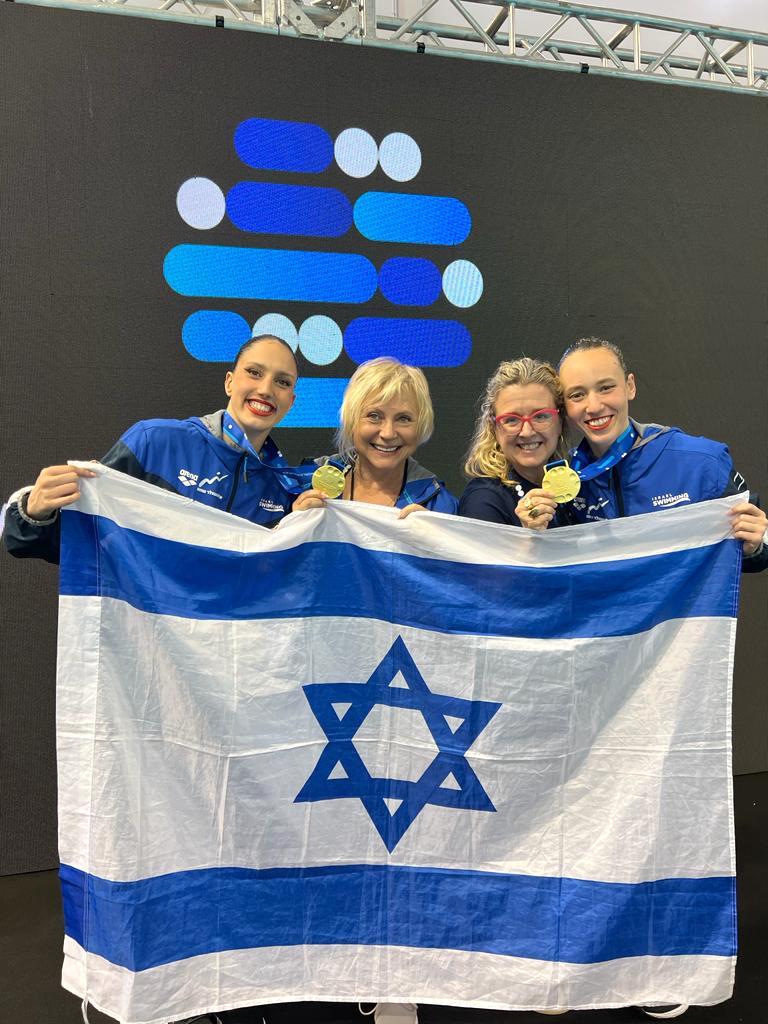
It all paid off. They made history for Israel, winning gold in the technical duet ahead of traditional artistic swimming powerhouses like Ukraine and Japan, whose duets had won medals at the Tokyo Olympics. When the scores came up, Svetlana stood frozen in shock; Shelly and Ariel were in tears.
“This day is definitely one of the best days in my life,” Ariel said. “We never even dreamed of it, that is what made it so special. The coaches and us tried inventing one of the hardest duets ever, I think we succeeded. We made our country prouder than ever.”
Ariel has been extremely competitive from a very young age. Her mother was on the Ukrainian basketball national team and really wanted her daughter to be involved in sports as well. Ariel first tried tennis and swimming, until a synchronized swimming coach spotted her at the pool and asked her if she’d like to try. Immediately, she was hooked and knew she wanted to go far.
Shelly is just as competitive and passionate, having learned how to swim and to love the water at seven months old. When she was five, she spotted synchronized swimmers across the pool and immediately begged her mother to join.
“The Olympic dream was always there,” she explained. “I have this very strong memory of the night before my first Israel championship when I was 10. I was laying on my bed, kind of speaking with God. It may sound silly, but I wanted it so much, so I told him that I would do everything I could tomorrow and that I hoped it would help me someday to go to the Olympics. The Tokyo Olympic games were almost exactly as I imagined all my life. The only thing that was missing was the crowd, but it was an incredible experience which gave a lot of motivation to continue for another round. I am happy that now I can experience this Olympic cycle with Ariel.”
Both are certainly eyeing the Paris Olympic Games, and believe in it more than ever before. The pair won another gold medal at the World Cup Super Final a few weeks ago with what was at the time the highest Degree of Difficulty yet. The team has been just as successful, also winning gold in the free team at that meet.
Last week in Oświęcim, the Israeli squad became European Champion for the first time by winning the free combination event. Eden, Shelly and Ariel stood tall and proud on the podium beside their teammates as the Israeli national anthem resonated at an artistic swimming European Championships. They also won bronze in the free team event.
“These medals are a reminder that everything is possible and that we are now fighting amongst the best in the sport,” Shelly said. “Winning gold was extremely powerful, especially in the location the competition was held. We will remember it forever, and we will keep dreaming big.”
Svetlana hopes these good results and the success of the national team will only bring more support and recognition in the country, and help the sport grow. Only last year was Israel able to field three full national team squads across all age groups.
All athletes have rallied around the goal of bringing their country to the medal stands. Since 2018, they have understood that the rise is indeed possible and that they should not be counted out.
“One year ago, I posted something about the Olympics Games on social media, some memories and pictures from Tokyo, and I wrote, ‘Next time, with the team’,” Svetlana said. “Somebody replied saying they would be interested to know how we were going to do it because it wasn’t possible. If you had asked me about it again five months ago, I would have still agreed. But now, nothing is impossible. So, we will go for it, we will fight for it, and we will do everything.”
With the results the 2023 season has brought so far, the Israeli swimmers and coaches are right to continue fearlessly raise the bar as they head into the World Championships in Fukuoka. As for the future, they have undoubtedly set their sights on the 2024 World Championships, the ultimate Olympic qualification event.
ARTICLE BY CHRISTINA MARMET
Cover photo: Oded Karni / Israel Olympic Committee. All photos in the article are from Svetlana Blecher unless specified otherwise.
If you’ve enjoyed our coverage, please consider donating to Inside Synchro! Any amount helps us run the site and travel costs to cover meets during the season.

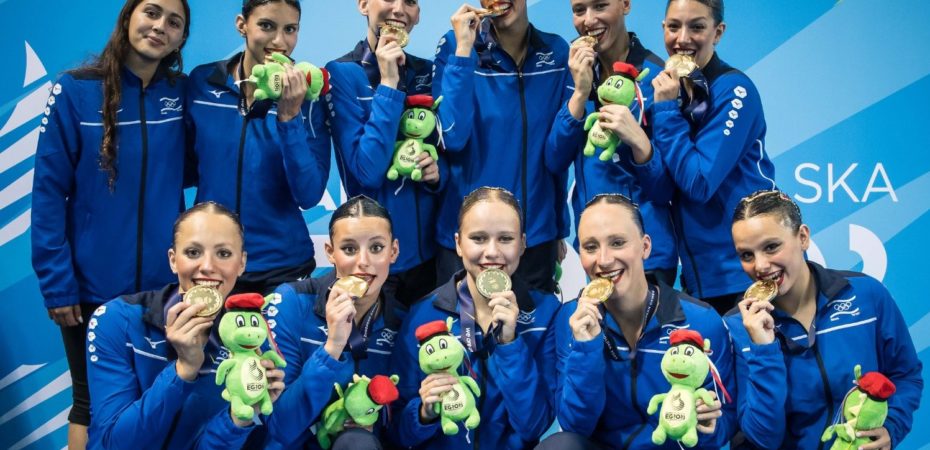
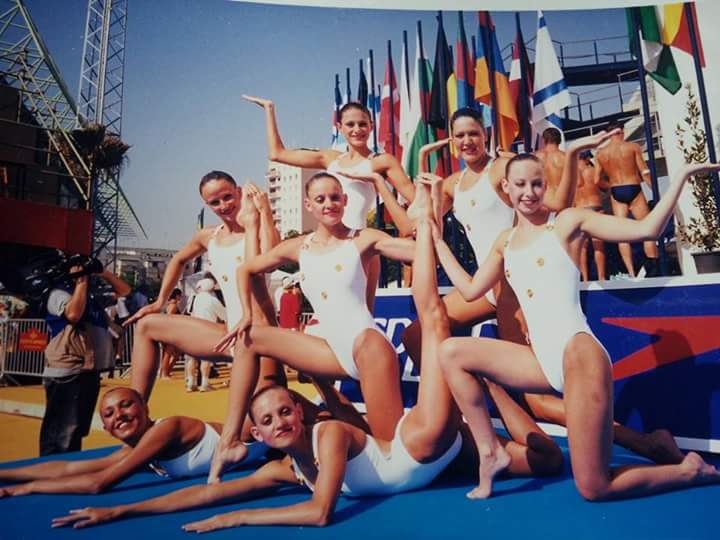
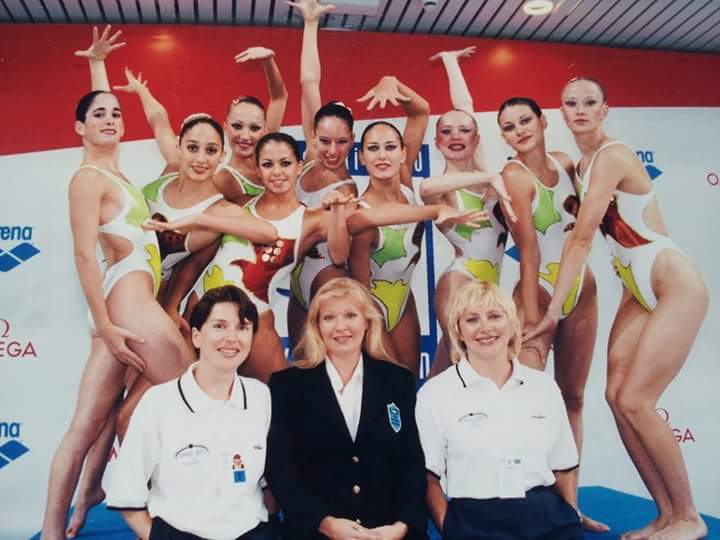
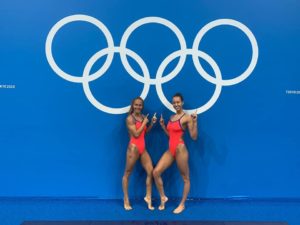
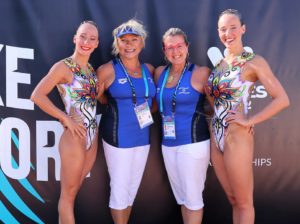
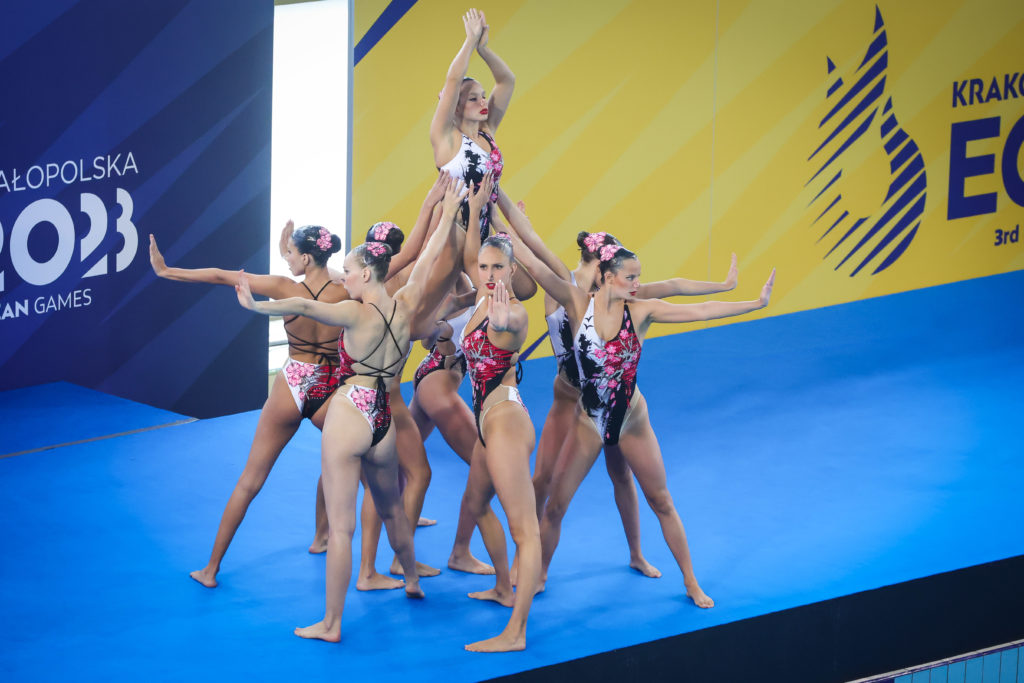
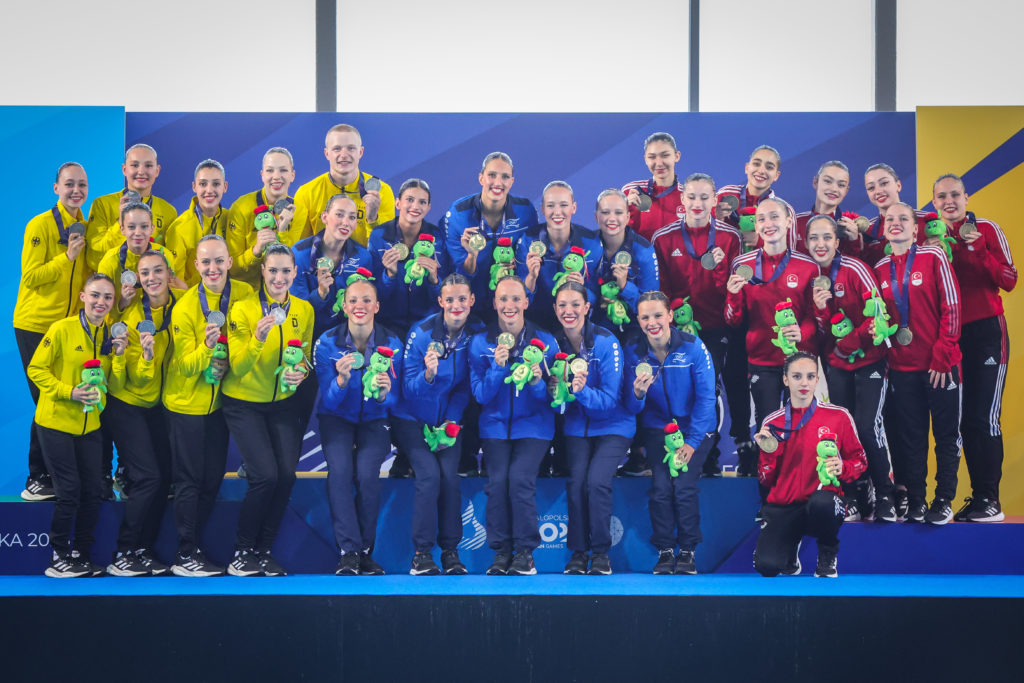
When will the synchronized swimming be shown on TV? We received Olympic coverage on NBC.